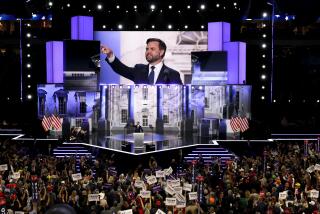PERSPECTIVE ON THE DRAFT : What Did You Do Against the War? : It’s time to honor those, like Clinton, whose consciences wouldn’t allow them to fight in an unjust war.
In the spring of 1969, I happened to be sitting next to an 18-year-old boy on an airplane headed for San Francisco. He was the son of a Nebraskan farmer and had just graduated from high school. He was nervous, but excited; he was on his way to Vietnam. I had been an anti-war activist since 1964, but I didn’t want to deepen his fear. As I listened, I pictured the student union at UC Berkeley, where long lines of young men waited their turn to speak with a brilliant draft counselor whose talent for helping men evade the draft had earned him a national reputation. This inductee, straight from the cornfield, would never meet the Berkeley wizard of draft evasion.
As long as President Bush thinks it’s in the nation’s interest to refight the Vietnam War, let’s get our history right. Sure, it was largely a war fought disproportionately by young boys from minority and working-class backgrounds. This is not news. Like my young Nebraskan acquaintance, they lived in communities that supported the war and felt it their patriotic duty to fight. Even if they opposed the war, they rarely knew anyone who could help them evade the draft. So, they went.
For those like Bill Clinton, it was a different story. On college campuses, an active anti-war movement supported draft resistance. Some of those who supported the war, of course, went to Vietnam. Millions of educated young men, it must be admitted, avoided the draft--not out of moral outrage--but because they feared the jungles of Vietnam, didn’t want to disrupt their lives, didn’t want to die in a war they didn’t quite understand.
Bill Clinton, in contrast, knew exactly why he wanted to avoid the draft: He passionately opposed the war. Like many other anti-war activists, he regarded our foreign policy as disastrous and viewed the war as immoral. Clinton acted from conviction, not from cowardice.
Although his family was neither wealthy nor well-connected, Clinton’s own stellar achievements as a student gave him the connections he needed to avoid the draft. But he didn’t just seek to save his own skin. As he wrote in that now famous letter, he could not fight in a war he morally opposed.
I recently met a woman who knew Clinton when he studied as a Rhodes scholar in England. She remembers his passionate objection to the war, his participation in peaceful demonstrations, his anguish over how and whether the war would ever be stopped.
We forget how many honorable young men who opposed the Vietnam War wrestled with their consciences. Much of society ostracized them; many parents disowned them. Many forfeited careers, gained prison records and forever carried the stigma of being a “draft dodger.”
I knew many of these young men. In 1965, one of my friends gave up his ROTC scholarship and sacrificed a college education because he so strongly opposed the Vietnam War. Another friend learned self-hypnosis, faked psychosis during his induction physical and forfeited a medical career because of a bogus record of mental illness. The parents of one friend who went to Canada died without ever speaking to their son again. Another friend, who went to jail as a conscientious objector, came back as broken as some of the most tortured Vietnam veterans.
The choices for those who objected to the Vietnam War, it should be remembered, were few. Some went to Canada and became reluctant refugees. Some went to jail and became political prisoners. The luckiest draft resisters had parents, professors, family doctors, draft counselors or sympathetic draft boards that conspired to help them avoid the draft.
To be sure, Clinton has not told his story well. As early as the New Hampshire primary, he needed to explain how and why he opposed the Vietnam War. He should have honored his conviction and headed off accusations of cowardice. Given the post-Desert Storm military euphoria, his reluctance was understandable, but terribly misguided.
By the end of the Gulf War, the nation finally honored its Vietnam veterans. Isn’t it time to honor another group of brave men, those who sacrificed college educations, forfeited careers, braved jail sentences, became political refugees in far-off lands because their consciences would not allow them to fight in an unjust war?
By dredging up the draft issue, President Bush has once again demonstrated that he is not the leader who can heal the nation’s divisions or wounds. This country has already lost enough men to the Vietnam War--as both soldiers and anti-war activists. Those men--like Bill Clinton--who managed to salvage their lives and careers should not be sacrificed on the altar of political expediency. I, for one, would rather elect a President who avoided the draft out of conscience, than a man who views military adventures as a means of invigorating his manhood and shoring up his popularity.










